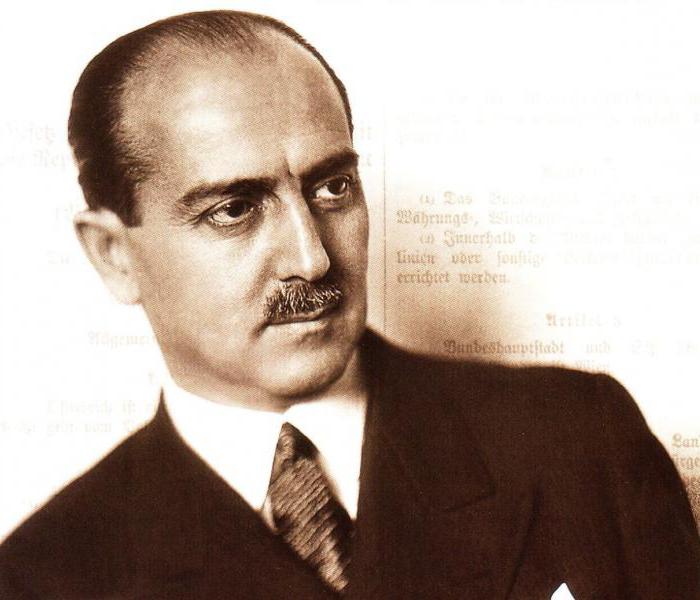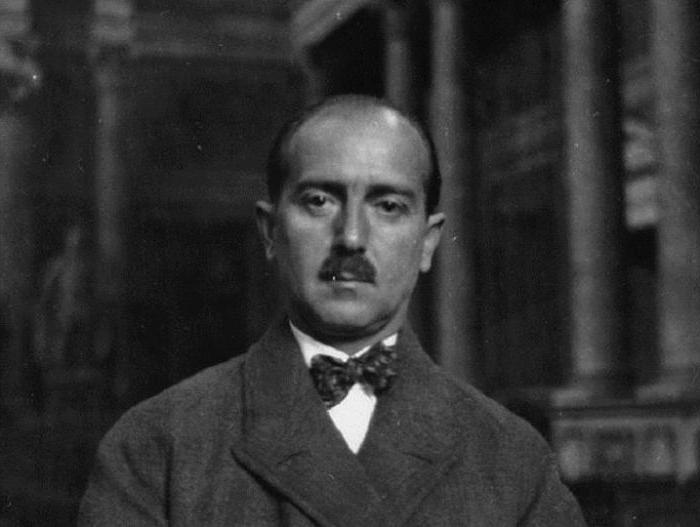Hans Kelsen (photo below) is an American lawyer of Austrian descent, a philosopher, teacher and author of works on international law, who formulated a “pure theory of law”.
Prominent lawyer and philosopher
As a professor of law at the University of Vienna, Kelsen published several works, and in 1919 he was asked to write a constitution, which the Republic of Austria adopted in 1920. He served in the Constitutional Court until he lost his seat for political reasons. Due to his Jewish origin, Hans Kelsen’s biography is marked by repeated movements from country to country, but this allowed him to communicate with lawyers around the world. From Vienna, he went to Cologne, where he taught and wrote about international law, until the Nazi occupation forced his family to move to Switzerland. In 1940 he immigrated to the United States, where he taught until 1952 and worked as legal adviser to the UN War Crimes Commission. His 900-page Security Council study, entitled “United Nations Law,” has been reprinted several times.

Kelsen wrote nearly 400 works on legal philosophy. He rejected the theory of natural law, and his views were most fully developed in the posthumously published "General Theory of Norms" (1975). Hans Kelsen is a representative of the school of law, which monitors the legitimacy of legislation to a fundamental “basic norm”, the universal status of which does not depend on morality. His “pure theory” was a Kantian interpretation of legal positivism and remains an important starting point in the world of legal thought.
Early biography and family
Hans Kelsen was born in Prague (at that time - Austria-Hungary) on October 11, 1881. When he was 3 years old, his middle-class German-speaking family of Jewish descent moved to Vienna. There he was educated. Although Kelsen was primarily interested in philosophy, literature, logic, mathematics and science, he studied law at the University of Vienna and received his doctorate in 1906. His knowledge in these areas had a great influence on his work. Agnostic Kelsen converted to Catholicism in 1905 so that his Jewish origin would not jeopardize the possibility of teaching at the university, but the pedigree more than once created difficulties for him.

In 1905, he published his first book, The Theory of the State of Dante Alighieri. In 1908, Kelsen attended a seminar in Heidelberg conducted by Georg Jellinek, an authority on public law. In 1911, he received a license to conduct university lectures, published his first major work: a 700-page study, “Basic Problems of the Theory of Public Law”.
In May 1912, Kelsen married Margaret Bondi (1890–1973). A few days before the marriage, the couple switched to Lutheranism. The couple had two daughters.
Vienna school
In 1914, Kelsen founded and edited the Austrian Journal of Public Law (3 volumes). During World War I, he served as legal adviser to the Minister of War and acted as an adviser to the military and judicial administration. In 1918, Kelsen became an associate professor at the University of Vienna, and in 1919 - professor of public and administrative law. Over the next 10 years, he was engaged in research and taught law. Among his students were legal theorists: Adolph Merkle, Alfred Verdross, Felix Kaufmann, Fritz Sander, Erich Wegelin, Alf Ross, Charles Eisenmann, Louis Legas and Lacambra and Franz Weir, who formed the cultural movement known as the Vienna School. Kelsen has also been associated with scholars such as Otto Bauer, Max Adler, Joseph Schumpeter and Ludwig van Mises. Politically, he continued to be neutral, although he sympathized with the Social Democrats.
Austria: constitution and constitutional court
In 1919, Kelsen founded and edited the Journal of Public Law, thanks to which he received academic recognition. Then he was asked to develop a new Constitution of Austria, which was adopted in 1920 and remained unchanged in its main principles. Hans Kelsen is the founder of the concept of a constitutional court, the substantive legal effectiveness of which he substantiated. In 1925 he published in Berlin "General Political Theory."
Kelsen was appointed a member of the Austrian Constitutional Court, influenced many of his decisions, but in 1930 lost his post for political reasons. Catholic administrative authorities permitted remarriage, but lower courts deemed the permissions invalid. The Constitutional Court, led by Kelsen, overturned the decisions of lower courts, but in the end the Christian Social Party won the case. As a result, the political attacks on him became so dangerous that he was forced to move to Cologne.
Work in Germany
Kelsen taught at the University of Cologne. Prior to that, he studied the relationship between state law and international jurisprudence. Now he has focused on positive international law and the concept of sovereignty. In 1931, he published a reply to Karl Schmitt, “Who Should Be the Keeper of the Constitution?”, And in 1932 gave his second course of lectures in The Hague.
When the Nazis seized power in 1933, Kelsen was removed from his post. In the fall of the same year, he went to Geneva with his wife and two daughters to begin a new academic career at the Institut Universitaire des Hautes Etudes International.
Switzerland: Theory of Law
Despite the fact that Kelsen taught in a foreign language, he considered this period fruitful. In Geneva, a prominent lawyer closely interacted with Georges Skell, William Rappard, Paul Mantoux, Maurice Burkin, Guglielmo Ferrero, Paul Guggenheim and Hans Weberg. He taught courses and wrote on the topics of converting international law into state law, revising the Covenant of the League of Nations.

In 1934, Hans Kelsen published a study in French and German on legal technology in the field of interstate law and the legal process. In the same year he published The Pure Theory of Law. The work concerned hierarchical levels of international norms, obligations and rights, unity and contradictions of interstate and national jurisprudence, the relationship of two systems, norms, monistic and dualistic theories, and the primacy of the national legal system. In addition to teaching in Geneva, Kelsen lectured at the University of Prague until strong anti-Semitic sentiments among his students and overt persecution forced him to leave this post.
Work at harvard
At the beginning of World War II, convinced that Switzerland would take part in the conflict, Hans Kelsen decided to leave for the United States, although he was then almost 60 years old and had only basic knowledge of English. In the years 1940-1942. He worked as a research fellow at Harvard Law School, and in 1952 he published lectures by Oliver Wendell Holmes entitled Law and Peace in International Relations.
Go to Berkeley
In 1942, on the recommendation of the American lawyer Roscoe Pound, lawyer Hans Kelsen became a visiting professor at the Department of Political Science at the University of California at Berkeley and received American citizenship. From 1945 to 1952 He was a full professor of international law in Berkeley, where the situation favored his intensive and productive activities. In 1944–1945 his lectures touched on the origins of legal institutions, collective and individual responsibility, the international status of Germany, the principle of sovereign equality and the comparison of the Covenant of the League of Nations with the UN Charter. During this period he published the book “Peace through the Law” (1944) and “The General Theory of Law and the State” (1945).
Work at the UN
In 1945, Kelsen became legal adviser to the United Nations War Crimes Commission in Washington, and drafted the legal and technical aspects of the Nuremberg trials. He paid considerable attention to peacekeeping and international cooperation, especially in connection with the UN Charter, and in 1950 published the “United Nations Law,” a study by the Security Council on issues of membership, organization, as well as legal status in general, sanctions and functions UN. The work was cited a lot in the literature, reprinted several times.
In 1951, Kelsen taught international organizations in Seattle.
Social work
After resigning in 1952, Hans Kelsen published the work “Principles of International Law”, which included a systematic study of interstate offenses and sanctions, repression, and the creation and application of international and national jurisprudence. He continued to travel around the world, taught and gave conferences as a visiting professor in Geneva, Newport, The Hague (where he gave his third series of lectures in 1953), in Vienna, Copenhagen, Stockholm, Helsingfors, Edinburgh and Chicago. An outstanding lawyer and philosopher has won 11 honorary doctorates (Utrecht, Harvard, Chicago, Mexico City, Berkeley, Salamanca, Berlin, Vienna, New York, Paris, Salzburg) and countless scientific awards. Hans Kelsen died in Berkeley on April 19, 1973 at the age of 92.